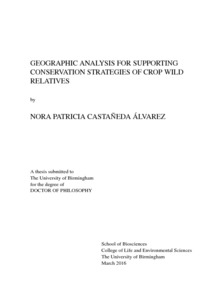Geographic analysis for supporting conservation strategies of crop wild relatives. Thesis (Ph.D.)
Crop wild relatives are important for agriculture due to the genetic richness they possess.
They have been used in plant breeding to develop high yielding varieties; varieties with improved resistance to biotic and abiotic stresses, and enhanced nutritional content. Securing their conservation in the long-term is critical to enable the continuous development of crops’ varieties able to respond to future challenges. The work presented in this thesis is a contribution to the effort of understanding the ex situ conservation gaps of crop wild relatives, their expected response to climate change and their needs for conservation. Methods used in this thesis include species distribution modelling, gap analyses, a case study assessing the preliminary IUCN Red List categories, species distribution projections onto future climate change scenarios, and an estimation of the global value of crop wild relatives based on their likelihood of being used in plant breeding, and the contributions of their associated crops to human diets and agricultural production systems. The methods used here can be applied to more crop gene pools for global conservation planning, and can also be adapted for analysis at the regional and national level.
The results presented here are being used to improve the conservation of the wild relatives of 29 crops.

